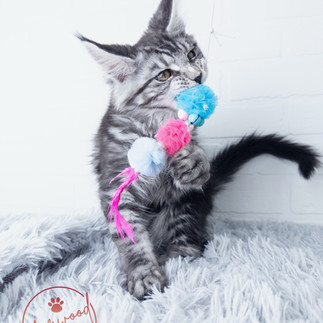Why Do Maine Coons Bite? Tips for Families
- Marwood Maine Coons

- Sep 29
- 2 min read
Maine Coons are gentle giants, but like any cat, they may sometimes use their teeth to communicate. Families who bring one of these big, beautiful cats into their lives are often surprised the first time it happens. Understanding why Maine Coons bite and what you can do about it will help keep your relationship positive and strong.
Why Maine Coons Might Bite
Cats use their mouths for more than eating. A gentle nibble, a firm grab, or even a harder bite can mean very different things. Here are the most common reasons a Maine Coon may bite:
Play behavior: Maine Coons are smart and playful. Sometimes they get carried away during games and forget their size. A playful nip isn’t meant to hurt, but it can feel like a lot from a cat this big.
Overstimulation: Cats, even affectionate ones, can become overstimulated when petted too long. Biting is often a way of saying, “That’s enough for now.”
Teething: Kittens naturally explore the world with their mouths, and during teething, chewing can relieve discomfort.
Communication: Sometimes a bite means “I want attention” or “Give me space.” Maine Coons are highly expressive cats, and biting can be part of how they talk to you.
Fear or stress: If a Maine Coon feels cornered, threatened, or scared, they may use biting as a last resort.
What Families Should Do
The key to handling biting is understanding and responding calmly. Here are some steps families can take:
Redirect play: Never use your hands as toys. Keep wand toys, balls, or kicker toys on hand so your Maine Coon learns what is okay to bite.
Watch body language: Jackson Galaxy, the well-known cat behaviorist, often reminds us to read our cats. A twitching tail, pinned-back ears, or dilated pupils can signal overstimulation before a bite happens.
Teach boundaries: If your Maine Coon bites during play, end the game quietly and walk away. This teaches them that biting ends the fun.
Provide chewing outlets: For kittens, offer safe teething toys. For adults, provide plenty of enrichment—scratching posts, puzzle feeders, and climbing trees.
Stay calm: Never yell or punish a cat for biting. This will only increase stress and can make the behavior worse. Gentle redirection works far better.
Seek help if needed: If biting becomes frequent or severe, it can sometimes point to a health issue or deeper behavioral challenge. This is where Jackson Galaxy’s resources and videos online can be so helpful—he gives step-by-step advice for understanding cat behavior.
Final Thoughts
Maine Coons are affectionate, loyal, and family-oriented cats. Biting is usually just a form of communication, not aggression. By learning their signals, giving them the right outlets, and responding with patience, families can build trust and enjoy everything these wonderful cats have to offer.
👉 For more helpful information on your Marwood Maine Coon Kitten click the link below.








Comments